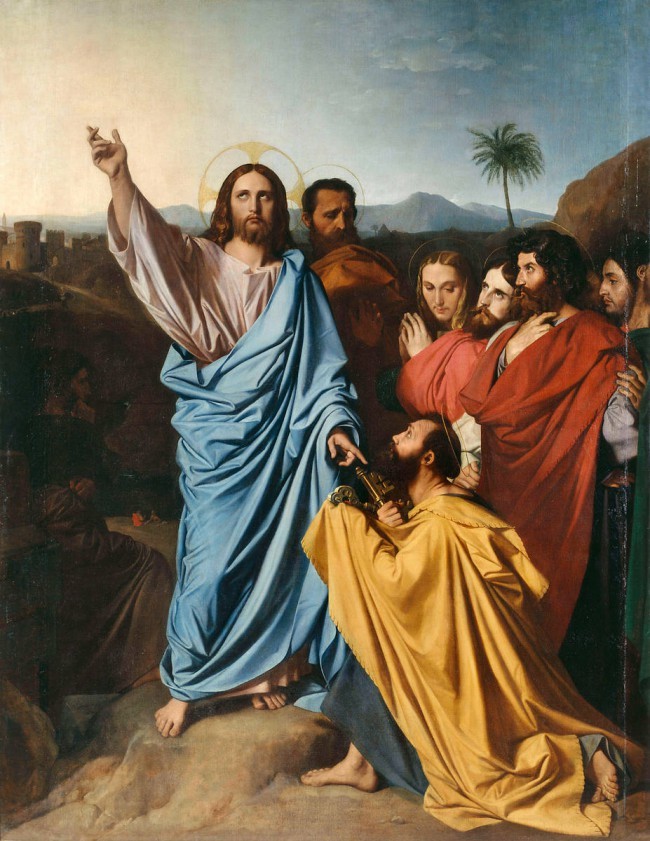Today’s Gospel (Matthew 16:13-20) is one of the most stereotypically Catholic – and even papal. It contains Christ’s authoritative words to Simon Peter: the changing of his name, the giving of the keys, the promise to the Church built on him.
Now, the Catholic temptation is to leap right away to this scene’s importance for establishing and defending papal and ecclesial authority. Indeed, as the text indicates, our Lord built his Church on Peter and on no other; he gave the keys to Peter and to no other. But this passage contains an even more fundamental principle, without which we can’t properly understand the papacy or ecclesial authority.
Our Lord’s most important words in the passage are not his renaming of Simon and the giving of the keys, but what comes before. In response to Simon Peter’s confession of faith, Jesus solemnly proclaims, “Blessed are you, Simon son of Jonah. For flesh and blood has not revealed this to you, but my heavenly Father.”
These words affirm not just Simon Peter’s personal faith but his dogmatic answer. They confirm what Saint John Henry Newman calls “the principle of dogma, that is, supernatural truths irrevocably committed to human language, imperfect because it is human, but definitive and necessary because given from above.”
Simon Peter’s words are not only a pious aspiration but also a theological dogma. Indeed, they can be pious precisely because they are dogmatic. Without dogma, piety is empty. His words express the truth about the Person of Jesus. They serve as the means of proclaiming that truth to others and handing it down to subsequent generations. More importantly, our Lord’s approval of Simon Peter’s dogmatic statement affirms the principle that we can speak intelligibly about the divine.
The principle of dogma is set in contrast, first of all, to human creativity: “flesh and blood has not revealed this to you.” The Church’s faith is received from God, not manufactured by man. It is not a collection of merely human ideas. Nor does our knowledge of God come from our own cleverness or insight. Our faith comes from Christ’s heavenly Father. He has spoken His Word into the world in such a manner that we can not only receive it but also hand it on.
But our fallen human nature doesn’t want to receive anything. That would indicate a lack of freedom. We prefer to imitate Eve and grasp. We are so enslaved to our autonomy that we reject even the given/received nature of our own bodies and choose to self-identify as something else.

Similarly, we rebel at the thought of a truth that we ourselves haven’t invented. So, rather than dogma, people speak about the Church’s “policies” or “stances.” Will the Church change her policy on women priests? What about the Church’s stance on abortion? The refusal to receive the faith according to the principle of dogma means that we have nothing sure or certain but only unfixed rules.
“Flesh and blood has not revealed this to you.” The principle of dogma is also set in contrast to popular opinion. This whole Gospel scene begins with our Lord’s question, “Who do people say that the Son of Man is?” The results of this primitive public opinion poll are disheartening and predictable.
The crowds don’t know who he is. But that doesn’t surprise our Lord. After all, he doesn’t ask the question to learn something. He asks so that the Apostles will learn not to look for the true faith in public opinion.
The Catholic faith doesn’t come by surveys, opinion polls, referenda, or even synods. It comes from God. Those other instruments might at times be helpful for understanding how best to express and hand on the faith. But the faith itself is of divine origin. Failure to adhere to the principle of dogma inevitably leads members of the Church to chase after public opinion, desperately trying to shape the faith into what others think it should be.
The principle of dogma also has tremendous meaning for the Church’s interior life and governance. This is why we must appreciate this principle prior to our Lord’s promises to Peter and the Church. Ecclesial and papal authority flow only from the principle of dogma and are in turn at its service. Peter receives authority not for his own purposes or pleasure, but for making known the truth of Jesus Christ that he himself professed.
The Church will be governed either by truth or by power. Of course, that’s true for any institution to some degree or another. But for the Church, whose very life comes from the Father’s revelation, it’s all the more important that she be governed by truth. If dogmatic truth does not govern, then the assertion of power is the only alternative. Clericalism is, in the end, precisely that prizing of human power, influence, and control over the authority of truth and dogma.
Finally, and most importantly, the principle of dogma serves our personal relationship with Jesus Christ. Which of course runs contrary to the current mindset that contrasts relationships (good) and dogma (bad). But the man who confesses, “You are the Christ, the Son of the living God,” is absolutely devoted to Jesus personally and thus desires to know him more. It follows that he should be entrusted with authority to bring others to know Christ personally and make that same confession of faith.
__________















